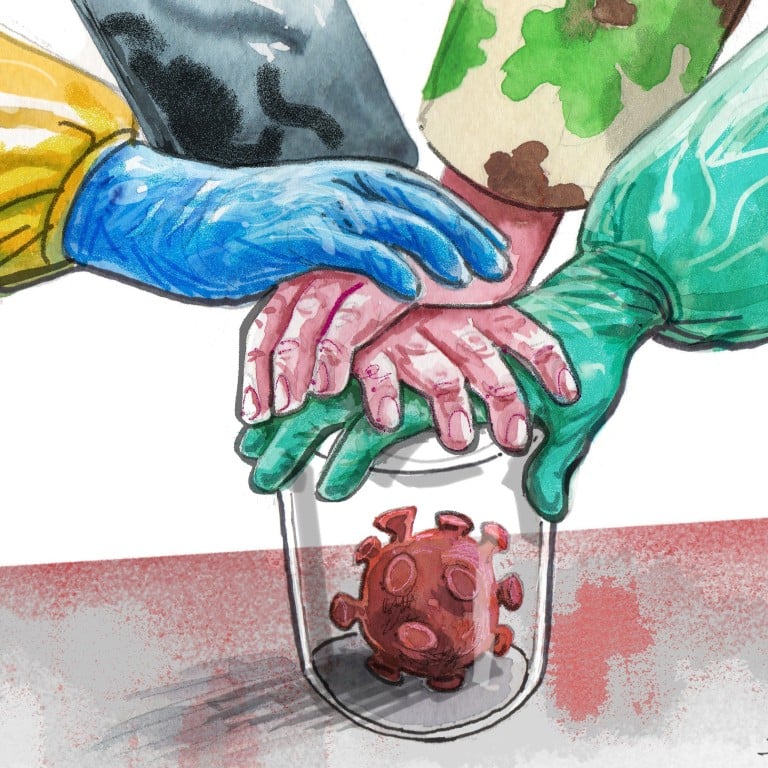
Why China’s commitment and ability to contain the coronavirus outbreak should not be doubted
- Confidence in Beijing’s pledge to end the epidemic is rooted in the country’s record in mass mobilisation to achieve objectives, including poverty alleviation
- The party leadership has also shown a willingness to change and correct mistakes, as seen in its admission of shortcomings in containment efforts so far
Let me explain why I am confident – why the world should be confident – that China will overcome the epidemic. I offer three reasons: China’s commitment, competence, and readiness to change and improve.
Taoran Notes, a WeChat account linked to the Chinese government, put it this way: “Concentrated treatment and quarantine, if not implemented effectively, is at best a dereliction of duty, at worst a crime. This is not a question of willing or unwilling, should or should not, but of necessity.”
China’s mobilisation is unprecedented in global health history. Nowhere could it work like it works in China. And the reason it works relates to how the party system works.
It is the same kind of commitment and mobilisation that the party has been using to win the battle against poverty since around 2012, lifting the final 100 million poor people out of absolute poverty, coordinating party leadership and organisations at central government and five levels of local government – provincial, municipal, county, township and village. The structural similarities between China’s war on the coronavirus and its war on poverty are striking.
China locked down millions in Hubei. Has it done more harm than good?
China’s readiness to change and improve is a critical part of its governance system. When I discuss the five or so primary reasons for China’s remarkable development over the past four decades, I always include the party’s willingness, albeit out of necessity, to admit and correct errors. Hence, in tracking this virus epic, I focus on the leadership’s forthright acknowledgement of “shortcomings and deficiencies” in the country’s response.
To stop the spread of virulent diseases, early action is essential. But how to develop an early warning system? The challenge is handling an avalanche of information, from diverse public and private sources and of variegated and uncertain quality.
Reacting swiftly, the party’s Central Committee authorised the National Supervisory Commission, the country’s top anti-corruption body, to “thoroughly investigate”.
A potent example is when local officials fear acting for the well-being of the people, as happened in the initial stages of the coronavirus outbreak, because they have not received directives from their superiors, and then, after they do receive directives, they overreact, because they put satisfying their superiors over caring for people.
Coronavirus: hundreds in China sign petition calling for free speech
Xi calls for “fighting the outbreak in an open and transparent manner”. Transparency is the key. In fact, though there is complexity in verification, the government holds daily briefings, updating in precise geographic detail the number of new confirmed cases, deaths and recoveries.
China says it will improve its systems of information collection and feedback, error correction and decision-making. The government must learn lessons from the outbreak to enhance its capacity for governance. Self-correction, the party says, is its hallmark.
If so, future historians may well look upon China’s fight against the coronavirus as a turning point in worldwide efforts to contain outbreaks of novel diseases and stop their spread, which globalisation and ubiquitous air travel has made vital. History may well thank China for pioneering how to deal with virulent contagions in a globalised world.
Robert Lawrence Kuhn, a public intellectual and international corporate strategist, won the China Reform Friendship Medal (2018)
Purchase the China AI Report 2020 brought to you by SCMP Research and enjoy a 20% discount (original price US$400). This 60-page all new intelligence report gives you first-hand insights and analysis into the latest industry developments and intelligence about China AI. Get exclusive access to our webinars for continuous learning, and interact with China AI executives in live Q&A. Offer valid until 31 March 2020.

